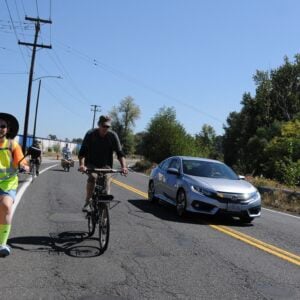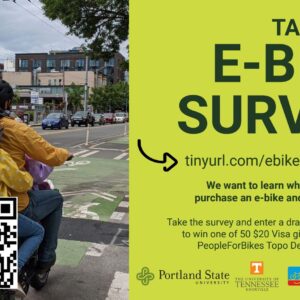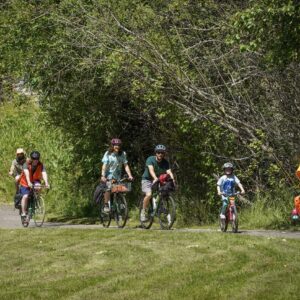Just got this email from the BTA:
Dear BTA Friends,
The Metro Natural Areas bond measure is a close call and may not pass in this election!
We are asking you to do two things to help it through:
1) Donate any amount of money. $10, $20, $100, $500 – whatever you can. Go to http://www.savenaturalareas.org and click “Contribute.” Every dollar helps.2) Ask five people TODAY! NOW! – by phone, email, or in person – if they’ve voted, and if they voted in favor of Measure 26-80.
Measure 26-80, if it passes, will fund bike and pedestrian trails all over the Metro region – from Beaverton to Forest Park, Tualatin to Wilsonville, Lake Oswego to Tigard, Gresham to the Columbia River and Boring, and more. It has the potential to add tremendously to our region’s biking and walking infrastructure.
Please help!
Thanks,
Michelle Poyourow
BTA
Those are your marching orders. Over and out.







Thanks for reading.
BikePortland has served this community with independent community journalism since 2005. We rely on subscriptions from readers like you to survive. Your financial support is vital in keeping this valuable resource alive and well.
Please subscribe today to strengthen and expand our work.
okay, i did this.
Washington residents: Please don’t vote for the snake oil that is I-933 unless you want to see developers running the same protection racket in our state that Measure 37 is letting them run in Oregon!
I voted for this measure, but somewhat reluctantly. Metro, like PDOT, is so biased toward Portland’s eastside that it’s hard for me to support them in their efforts.
The Portland bicycling projects that Metro is considering for funding are all on the eastside. Again. (Is it the westside’s role to subsidize bicycling projects on the eastside?)
From: http://www.bta4bikes.org/btablog/2006/11/02/action-%e2%80%93-increase-funding-for-bike-projects/
ACTION – Increase Funding for Bike Projects!
Posted by: Scott
Nov 02 2006, 1:36 pm
Every two years Metro allocates flexible regional transportation funds. Every two years the BTA works with Metro and citizens to increase the number and quality of bike projects that receive funding.
Here the Bike Projects that made the first cut list…
PORTLAND
1) 50’s Bicycle Boulevard
2) 70’S Bicycle Boulevard
3) East Burnside: Third to 14th avenues
4) Cully Boulevard: Northeast Prescott to Killingsworth
5) Sullivan’s Gulch Trail Study: Esplanade to 122nd Avenue
FYI, Cate, the Fanno Creek Greenway is on the list for funding under Measure 26-80, and it runs from SW Portland to the suburbs.
As the Powerline trail, which would connect NW Portland (Forst Park) with Beaverton and beyond.
Are these your top westside projects, or are there others?
Evan said “Are these your top westside projects, or are there others?”
Both those trails are primarily in Washington County. I’m looking at Portland.
If you want to understand my perspective, here’s a suggested process:
1. Look at page three, Bicycle Classifications, of the Portland Transportation System Plan for the Southwest District
http://www.portlandonline.com/shared/cfm/image.cfm?id=86090
2. Look at the City of Portland SW Bike Routes map
http://www.portlandonline.com/shared/cfm/image.cfm?id=101383
And the City of Portland – Portland by Bicycle map
http://www.portlandonline.com/shared/cfm/image.cfm?id=100362
And Metro’s Bike There map (I don’t have a link)
3. Notice how the City Bikeways from the step one map are rated (or coded) on the step two maps. (I don’t know why there are coding inconsistencies among the step two maps.) Are there more blue and green lines, or more yellow, orange, and red lines (or grey – worse than red)?
4. Compare the bike route colors in SW Portland to the rest of the city on the step two maps. Are they typically better or worse than the rest of the city?
5. Get on your bike and ride on the City Bikeways in SW Portland.
6. Compare that bicycling experience to riding on Portland’s eastside. Aside from the hills in parts of SW, how is the experience different?
7. Look at the history of funding for Portland bicycling projects over the last 10 – 20 years. Compare dollars spent on the eastside to dollars spent on the westside (outside downtown). Compare the number of projects funded in both areas during the same time period.
8. Consider where people making decisions about bicycling projects at PDOT, Metro, and the BTA typically ride their bikes. Consider how that knowledge and familiarity affects bicycling planning and decision making.
9. Consider how the latest PDOT bicycle counts are especially low on the westside. Given the many good bicycling alternatives in northwest Portland, that leaves southwest Portland as the area with possibly the worst counts. Why is that?
10. Look at the Portland projects currently under consideration for funding. In what part of town are they located?
11. Welcome to my world.
Cate-you make a great case.
I was mainly trying to make you feel better about voting for 26-80, not disagreeing with your main assertion that SW Portland is underserved by bike facilities. Connections over the hills was a major concern when we talked to cyclists for our Blueprint project, and 26-80 will help serve some of those needs, and the needs of people on the non-downtown westside.
I lived in Southwest Portland for a year and know it can be hard to get around by bike. I would also assert that it’s somewhat challenging to find good places for beginners to ride in Northwest, with all the traffic, hence the low numbers (of course, we also lose some to walking in NW).
And as much as I’m sure self-perception of need drives some planning, I can’t immediately think of a main PDOT bike person or BTA person who spends much time in the 70s or Cully, so I think we’re somewhat able to think about city needs outside of our own experience. For example, Roger Geller is also talking about fixing some of the missing gaps (red spots on the maps) in SW, but is looking for the right pot of money.
That said, probably three quarters of Portland’s residents live on the eastside, and SW’s hills and street layout are natural challenges to many of those considering biking. Hence, it’s not surprising that most of the money goes to the eastside. Hopefully soon (during the Bike Master Plan Update) we can find some good projects in SW and get them built. What’s at the top of your list?
Evan, thank you for your thoughtful response.
Evan said “…SW’s hills and street layout are natural challenges to many of those considering biking. Hence, it’s not surprising that most of the money goes to the eastside.” I totally disagree. The hills and street layout are far less of a problem than the condition of the roads. The unimproved two lane roads (no paved shoulder, bike lane, or sidewalk) make many of the SW roads dangerous for bicyclists. (As an example, SW Vermont west of 45th is relatively flat and straight, but it’s not safe for bicyclists.)
People in my neighborhood don’t ride their bikes because the streets aren’t safe, not because the roads are hilly or curve around. Parents don’t let their children ride their bikes around their own neighborhood. The kids want to – the streets aren’t safe for bikes.
More people on the eastside and easier projects there does not justify neglecting SW. If anything, the need is greater in SW and deserves more resources. (I realize that will never happen.)
“Hopefully soon (during the Bike Master Plan Update) we can find some good projects in SW and get them built.” Yeah, hopefully.
“What’s at the top of your list?” Pick any of the yellow, orange, red or grey streets. I don’t care which ones. There’s a wide selection to choose from.